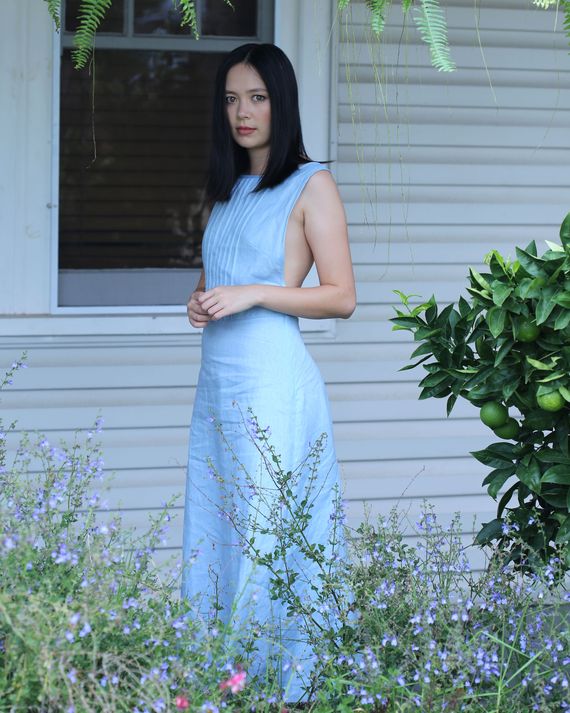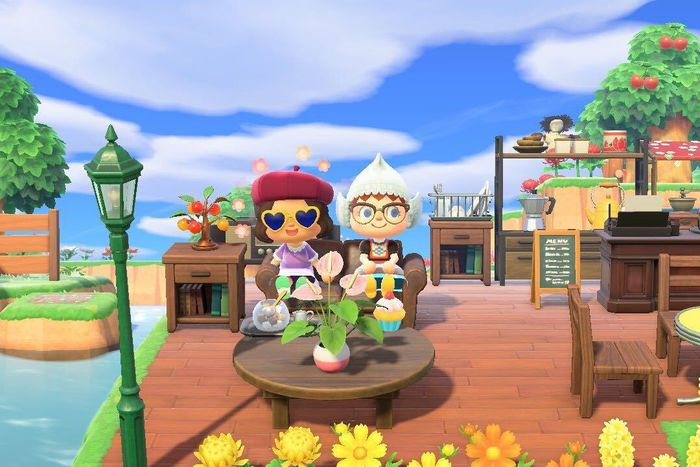
When Mythic Quest’s Charlotte Nicdao and I realized we both had a problem with cockroaches running around our homes, we decided to exterminate them together. Several days earlier, when I requested we try to figure out some activity to do over Zoom rather than the standard “How’re things going for you?” COVID-safe interview protocol, Nicdao suggested playing the Nintendo Switch game Animal Crossing. But, as Nicdao and I soon realized, we’d both spent tons and tons of time with Animal Crossing when the pandemic first took hold last year and then abandoned it. Now, many months and a few incredible vaccines later, both our cute little cartoonish Animal Crossing homes were infested with roaches.
So I invite her into my video-game house, and we both start running around to stomp on the bugs. “Look at their little ghosts!” Nicdao says when the first bug is squashed. A tiny, blue bug-shaped cloud floats up into the air and disappears. “Oh, that’s bad. Do you see the life leaving them in little wisps?!” Once again, Animal Crossing is pulling off its uncanny magic; we are on opposite sides of the country, but it feels like we’re together in this cute house, witnessing cockroach souls leave their bodies.
Pandemic-era interview limitations notwithstanding, the video game co-op experience is an especially apt way to chat with Nicdao about the currently airing second season of the Apple TV+ series Mythic Quest. She plays video-game engineer and designer Poppy Li, one of the chief creative minds behind a popular MMORPG game also called Mythic Quest. Although Nicdao did a bunch of research into video-gaming communities before starting to film Mythic Quest’s first season, she’d had very little firsthand gaming experience. “I’m genuinely ashamed to admit that my main understanding of the gaming community was Gamergate,” she tells me.
But then, as happened to so many of us, the pandemic hit, and so did Animal Crossing. She started playing before shooting season two, before she realized that her story line in the second season would largely be about Poppy’s desire to build a video-game expansion focused on construction and creativity with persistent environmental changes throughout the game world. “I was like, I freaking get it. I am so excited by how many people got into this game and were so individually obsessed with and invested in what they were making with the tools they were given.”
It wasn’t difficult for Nicdao to find her way into Poppy in season one. She had spent years pursuing acting, landing roles on Australian projects for over a decade, but the process of coming out to audition in Los Angeles was a continual frustration of close calls. So when she did get cast on Mythic Quest, it was the firsthand knowledge of that almost-but-not-quite sensation that shaped her portrayal of Poppy: “Her story is so much about wanting recognition, wanting her ideas to feel valid.” In season two, though, Poppy’s been elevated to a chief creative role alongside Rob McElhenney’s Ian, so her ideas are being heard, and now her story is more about feeling an intense excitement about a vision she struggles to realize. “Feeling this passion for this specific thing that she wants to create, which is an opportunity for the players of the game to also feel like their ideas are valid? I feel like this was very informed by … yeah, by playing this game. Like, I am making the island! I am the god of all things!!”
As she says this, I hear Nicdao slide straight into Poppy’s voice. It’s easy to see her channeling that single-minded focus into her character, especially because Poppy spends much of the season so overwhelmed by her concept for a new expansion that she treats everyone else terribly. The turn doesn’t come from nowhere; Nicdao points out that there are a lot of red flags in Poppy’s behavior in season one, things that are easy to excuse when Poppy doesn’t actually have much power in the company. She is a terrible collaborator, just as exploitative and single-minded as her boss, especially as she ignores and manipulates lower-level employees like the game testers. By season two, she is fully empowered to be a creative genius but also a real jerk. Her low-key cruelty to people who work underneath her escalates to outright tyranny; Dana, a game tester Poppy could have mentored into a productive partnership, becomes the overworked, mistreated subject of Poppy’s scorn. “As soon as she has power,” Nicdao says, “it’s like, Wait, I don’t know if you’re a very good person.”
So much of what distinguishes Mythic Quest is its willingness to start as a workplace comedy but then go deep into the creative process. In Poppy’s case, it’s about exploring what happens when the show’s favorite creative personality becomes really, really mean. “I do think our characters are good people at heart,” Nicdao says, reflecting on Poppy’s season two heel turn. “They grow and they learn, and you see both Poppy and Ian’s vulnerability and insecurity underneath. But it’s still like, how much do you let a creative genius get away with? How do they use the people around them in service of their art?”
As we talk, Nicdao and I wander around each other’s Animal Crossing spaces, marveling at just how much time we both funneled into this game and what a useful coping mechanism it was when we badly needed it a year ago. For any Animal Crossing player, a quick glimpse of Nicdao’s island makes it clear exactly how many hours she has spent with the game — beautiful terraformed spaces, meticulous DIY projects that make me envious (I never found that vase recipe!), a lovely rooftop pool area where she somehow found the perfect spot for the game’s strange oyster-shaped lounge furniture. (My own island, to be clear, reveals someone who stopped playing a little earlier but who was every bit as obsessed.)
For Nicdao, the game was an unexpected aid for her work, but it was also a way to stay connected with her parents in Australia while she was in California shooting season two. Her mom and dad both bought Switches so they could play at the same time. Nicdao has a screenshot saved on her phone from setting up a big surprise Animal Crossing picnic area for her mother’s birthday. Her mom, Nicdao says, was as happy as anyone surprised with an actual picnic could ever have been: “I look at [that screenshot] and it makes me so happy. And I’m also like, What was going on?” Animal Crossing, Nicdao and I agree, was the game we needed it to be at the moment we most needed it.
“Look at your hose reel!” I exclaim in appreciation of a particularly effective gardening setup on Nicdao’s island. Nicdao bursts out laughing and calls out to her publicist, silently listening in on this conversation, “I’m loving the idea, Emily, of you sitting in and listening to this and you can’t see anything we’re doing, but we’re just getting really excited about hose reels.” The hose reel is something Poppy Li would also appreciate, though, a tiny detail that makes an imaginary world richer and more textured.
“Again, I’m … really seeing all the hours that went into this,” Nicdao says as her avatar wanders up a set of stairs into another painstakingly organized tableau. She is half-pleased, half-rueful, as she says it. She is proud of this adorable cartoon island — as well she should be — and it was not just a source of pandemic solace for her. It’s been vital for her work. At the same time, as she leads me up exhaustively terraformed steps toward the manicured landscaping around the island museum, it is also remarkable to think back on just how many hours it took to create this. She leads me around a back corner: “So, this is the museum gift shop.”




